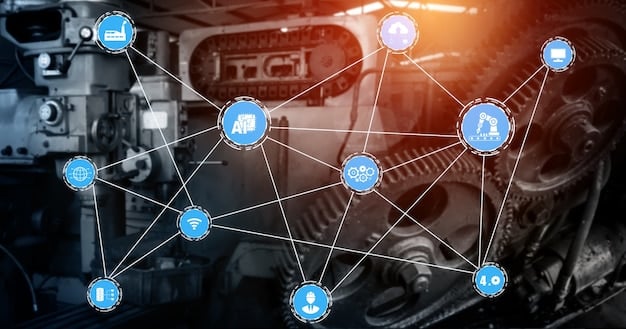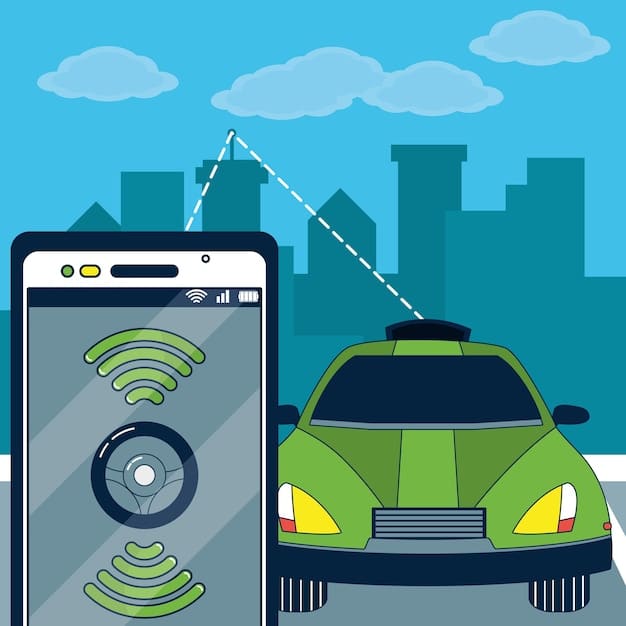Blockchain in Automotive: Transforming the Industry?

Blockchain technology is revolutionizing the automotive industry by enhancing security, transparency, and efficiency across various applications, from supply chain management to vehicle lifecycle tracking.
The automotive industry is on the cusp of a major transformation, and blockchain technology is emerging as a key driver. From enhancing supply chain transparency to securing vehicle data and enabling new business models, the potential applications are vast and transformative. Let’s explore how this innovative technology is poised to revolutionize the way cars are made, sold, and used.
Understanding Blockchain Technology
Blockchain, at its core, is a distributed, immutable ledger that records transactions across many computers. This decentralized nature makes it incredibly secure and transparent, as no single entity controls the information. The technology’s ability to create a tamper-proof record has wide-ranging implications for various industries.
Key Features of Blockchain
Blockchain technology offers several key features that make it attractive for use in the automotive industry.
- Decentralization: Data is distributed across a network, eliminating central points of failure.
- Transparency: All participants can view the transactions, enhancing trust and accountability.
- Security: Cryptographic techniques ensure data integrity and prevent tampering.
- Immutability: Once a transaction is recorded, it cannot be altered or deleted.
These features, combined with its potential to streamline processes and enhance security, positions blockchain as a pivotal technology for the automotive sector.
Enhancing Supply Chain Management
One of the most promising applications of blockchain in the automotive industry is in supply chain management. The automotive supply chain is complex, involving numerous suppliers and components from around the world. Blockchain can provide a secure and transparent way to track each part from origin to assembly.

Tracking Components with Blockchain
By implementing blockchain, automotive companies can track components throughout the supply chain with unprecedented accuracy. This can help to identify and prevent counterfeit parts from entering the system, ensuring higher quality and safety standards.
- Improved Traceability: Track the origin and movement of each component.
- Reduced Counterfeiting: Verify the authenticity of parts to prevent the use of fakes.
- Enhanced Efficiency: Streamline logistics and reduce delays in the supply chain.
- Real-Time Visibility: Gain insights into the status of components in real-time.
The use of blockchain in supply chain management can lead to significant cost savings and improved efficiency for automotive manufacturers.
Securing Vehicle Data and Preventing Cyber Attacks
As vehicles become increasingly connected, the risk of cyber attacks and data breaches increases. Blockchain can help to secure vehicle data and prevent unauthorized access. By using blockchain-based identity and access management systems, automotive companies can protect sensitive data and ensure the safety of their vehicles.
Blockchain for Vehicle Security
Blockchain offers several benefits for securing vehicle data and preventing cyber attacks.
- Secure Identity Management: Use blockchain to create secure digital identities for vehicles and drivers.
- Data Encryption: Encrypt sensitive data using blockchain-based cryptographic techniques.
- Tamper-Proof Logs: Maintain immutable logs of all vehicle data and transactions.
- Unauthorized Access Prevention: Implement blockchain-based access control systems to prevent unauthorized access to vehicle data and functions.
These measures can significantly reduce the risk of cyber attacks and data breaches, ensuring the safety and security of connected vehicles.
Facilitating Secure Over-the-Air (OTA) Updates
Over-the-air (OTA) updates are becoming more common in the automotive industry, allowing manufacturers to remotely update vehicle software. However, these updates also pose a security risk, as they could be intercepted and manipulated by malicious actors. Blockchain can provide a secure and reliable way to deliver OTA updates.
Ensuring OTA Update Integrity
Blockchain can ensure the integrity of OTA updates by creating a secure, tamper-proof audit trail.

- Verifiable Updates: Ensure that OTA updates are authentic and have not been tampered with.
- Secure Distribution: Distribute updates through a decentralized network, reducing the risk of interception.
- Audit Trail: Maintain a complete audit trail of all OTA updates, making it easy to identify and address any issues.
By using blockchain to secure OTA updates, automotive companies can ensure that their vehicles are always running the latest and most secure software.
Enabling New Business Models
Blockchain can also enable new business models in the automotive industry, such as secure peer-to-peer car sharing and decentralized marketplaces for vehicle data. These models can create new revenue streams for automotive companies and provide consumers with more flexibility and control over their vehicles.
Blockchain for Car Sharing and Data Marketplaces
Blockchain can facilitate secure and transparent car sharing and data marketplaces.
- Secure Car Sharing: Use blockchain to create secure and transparent car sharing platforms.
- Decentralized Data Marketplaces: Enable consumers to monetize their vehicle data by participating in decentralized marketplaces.
- Smart Contracts: Automate the terms of car sharing and data agreements using smart contracts.
These new business models can create new opportunities for automotive companies and provide consumers with more value and control.
Challenges and Future Outlook
While the potential of blockchain in the automotive industry is significant, there are also challenges to overcome. These include scalability, regulatory uncertainty, and the need for industry-wide collaboration. However, as the technology matures and adoption increases, these challenges are likely to be addressed, paving the way for widespread implementation.
Overcoming Challenges
Addressing the challenges associated with blockchain adoption will require collaboration and innovation.
- Scalability Solutions: Develop scalable blockchain solutions that can handle the demands of the automotive industry.
- Regulatory Clarity: Work with regulators to create clear and consistent guidelines for the use of blockchain in the automotive sector.
- Industry Collaboration: Foster collaboration among automotive companies, technology providers, and regulators to drive adoption.
By addressing these challenges, the automotive industry can fully realize the potential of blockchain technology.
| Key Aspect | Brief Description |
|---|---|
| 📦 Supply Chain Tracking | Blockchain enhances transparency and traceability of automotive parts from origin to assembly. |
| 🛡️ Data Security | Blockchain secures vehicle data and prevents unauthorized access and cyber attacks. |
| 📡 OTA Updates | Blockchain ensures the integrity and security of over-the-air (OTA) software updates for vehicles. |
| 🚗 New Business Models | Blockchain enables secure car sharing platforms and decentralized marketplaces for vehicle data. |
Frequently Asked Questions
▼
Blockchain is a decentralized, distributed, and immutable digital ledger used to record transactions across many computers. It ensures data integrity, transparency, and security without the need for a central authority.
▼
Blockchain improves supply chain management by providing end-to-end tracking of components, verifying authenticity, reducing counterfeiting, and ensuring real-time visibility throughout the supply chain.
▼
Yes, blockchain can secure vehicle data by using secure identity management, encrypting sensitive information, maintaining tamper-proof logs, and preventing unauthorized access through blockchain-based access control systems.
▼
Blockchain ensures the integrity of OTA updates by verifying their authenticity, securing distribution through a decentralized network, and maintaining a complete audit trail to identify and address issues effectively.
▼
Blockchain facilitates secure peer-to-peer car sharing, decentralized marketplaces for vehicle data, and smart contracts to automate the terms of agreements, creating new revenue streams and providing more consumer control.
Conclusion
Blockchain technology holds immense potential to transform the automotive industry. From enhancing supply chain transparency and securing vehicle data to enabling new business models, the applications are vast and promising. While challenges remain, the benefits of blockchain are clear, positioning it as a key technology for the future of automotive innovation.





